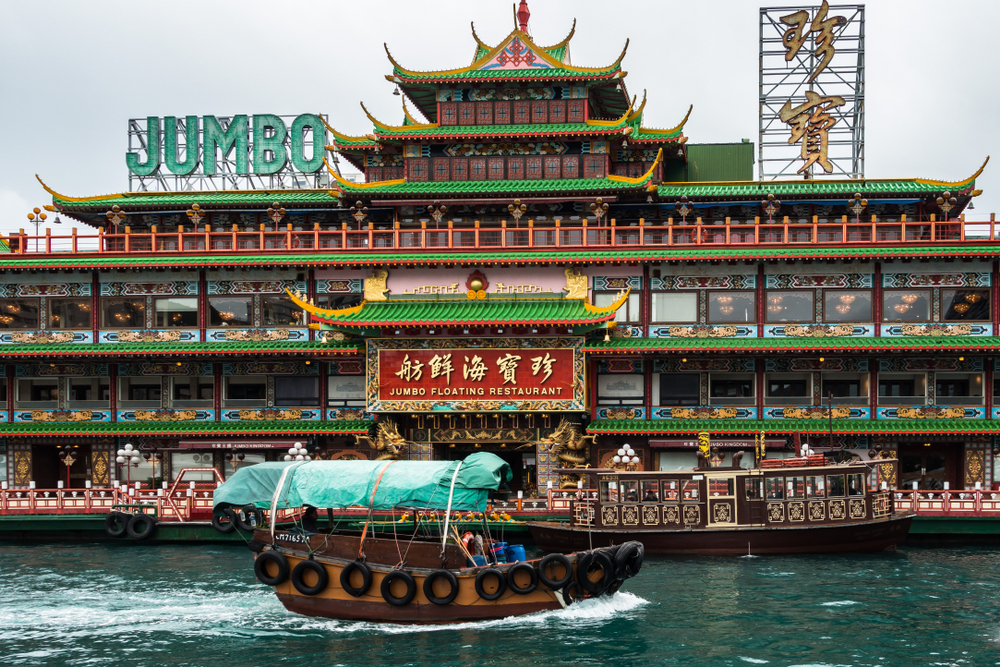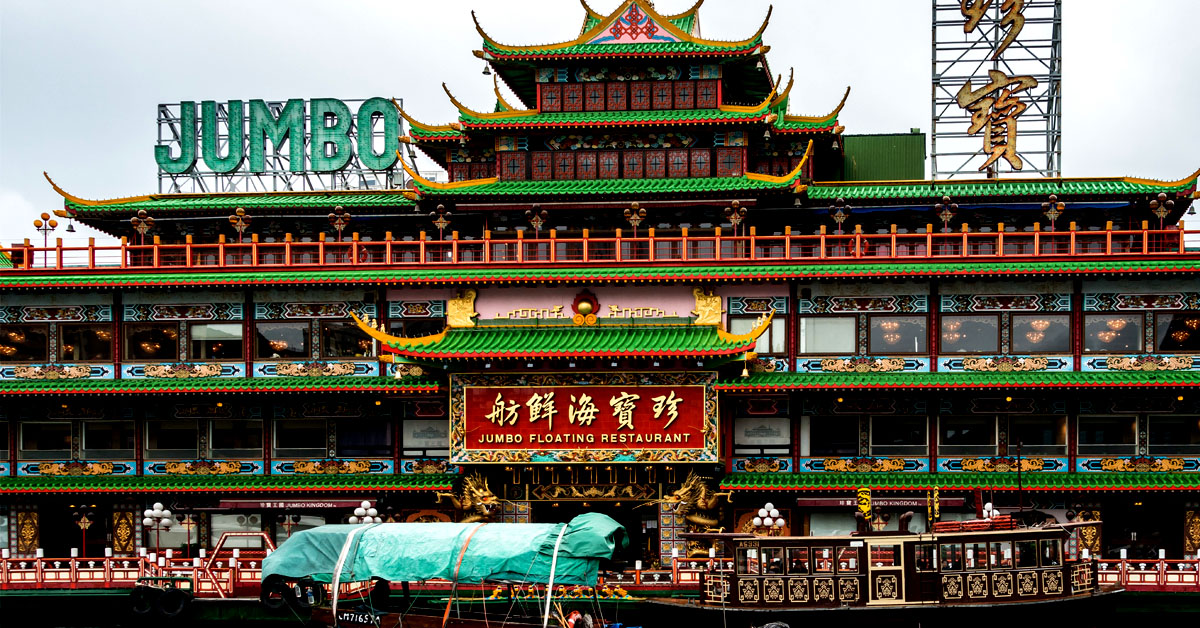It is one thing to be a once-renowned floating tourist attraction slash restaurant in financial straits, but it’s quite another for it to capsize while it’s being towed away after the business has been deemed too unprofitable.
If you were to read between the lines for subtext, it’s like some kind of divine intervention telling Aberdeen Restaurant Enterprises, the owner of Jumbo, that there’s nothing worth salvaging about this half-century old vessel.
Once Gilded With Luxury and Success

For a quick backstory, the floating restaurant was opened in 1976 by the late casino tycoon Stanley Ho.
Living up to its name, Jumbo was a massive vessel which was designed like a Chinese imperial palace, with jade-green eaves edged with gold and vermillion-lacquered railings, embodying the height of luxury in its glory days.
Reportedly, it cost HK$30 million to build the veritable ship, which is a lot of money back in the 70s.
Undeniably, it is a beautiful piece of architecture, and definitely the sort of extravagant spending you would expect from a casino business tycoon. It’s always the ships.
Of course, back when business was booming and it was seen as a national landmark, everything was smooth sailing, drawing visitors from all around the world, including important figures like Queen Elizabeth II.
Drowning in Financial Woes
But fast forward to March 2020, the restaurant closed down, because the COVID-19 pandemic has repeatedly proven that it’s the bane of all businesses, unless you’re an e-commerce site or something.
According to Operator Melco International Development, the business hasn’t been profitable since 2013, with its accumulated loss exceeding HK$100 million (S$17.7 million) in total.
The pandemic was really the final straw that broke the camel’s back, since its main source of revenue—tourism—was completely cut off, no thanks to international borders closing and the zero tolerance for COVID-19 policy insisted on Hong Kong by China.
Jumbo also lived up to its name in the worst ways possible; due to its size, it cost millions in maintenance fees every year.
The restaurant was a sinking ship that every smart businessman could see from miles away; in fact, when Aberdeen Restaurant Enterprises offered for other business and organisations to take over the restaurant, free-of-charge, all of them declined.
It’s a true testament to how bad business is, when people don’t even want the ship for free.
Simply Unsalvageable
Hence, it should come as no surprise that Aberdeen Restaurant Enterprises announced that Jumbo would be leaving Hong Kong and await a new operator at an undisclosed location last month, just before its licence expiration in June.
There’s no point being moored on Hong Kong’s shores and wasting more money if there’s no business to be had, after all.
Last Tuesday (14 Jun), the floating restaurant set off shortly before noon from the southern Hong Kong Island typhoon shelter, where it had stayed for nearly 50 years.
Five days after it was towed away, Jumbo capsized in the Southern China Sea, near the Paracel Islands due to “adverse conditions”.
Worse, its parent company said in a statement on Monday (20 Jun) that salvaging the wreckage would be “extremely difficult” as the water depth at the accident site is over 1,000m.
Though Aberdeen Restaurant Enterprises were “very saddened by the incident”, it’s a phrasing I would accept with a grain of salt, because the sea has just conveniently rid them of a drifting white elephant, leaving it to become the plaything of sea-floor marine animals… Where it might see more use, actually?
Some day, National Geographic should do a sea expedition to see what has become of the shipwreck.
Fortunately, there were no casualties during the accident.
In the parent company’s statement, they wrote that they had hired engineers to inspect the restaurant and install the necessary hoardings for the long trip, and acquired all the relevant approvals for the towing.
In other terms, they’re saying they took all the preventative measures, and it’s not their fault Jumbo sank like the Titanic.
Response from the Hong Kongers
For the city’s residents, Jumbo’s departure from its shores was met with regret and nostalgia.
Some of them even tapped into their poeticism, citing that the floating palace—a symbol of old luxury and glory—sailing across a charcoal grey ocean towards the horizon is an appropriate metaphor for Hong Kong’s future.
… Then the vessel capsized.
Talk about bleak?
Nonetheless, the shackle fits; ever since Hong Kong has been returned to China’s jurisdiction, its status as an international hub has been shaken, and the harsh pandemic restrictions imposed onto the city has only worsened the situation.
And that’s to say nothing of the internal dissent from the Hong Kongers that is slowly but surely being quelled by the stifling security laws that Beijing has put in place.
Whatever Hong Kong’s Jumbo was in the past, is now a heavy and mourned relic lying at the bottom of the sea.
Featured Image: Shutterstock / Francesco Bonino



